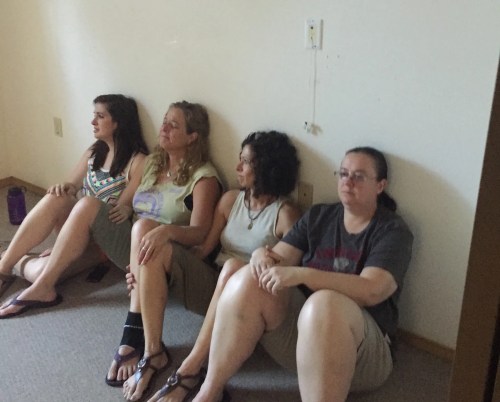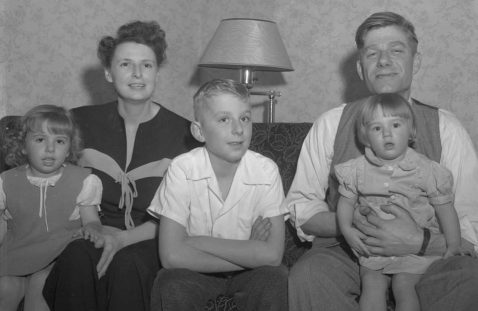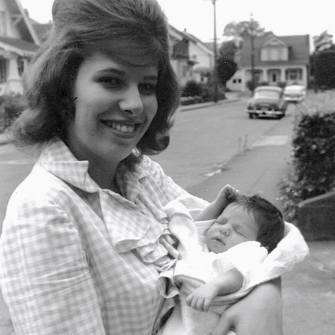And when she shall die,
Take her and cut her out in little stars,
And she will make the face of heaven so fine
That all the world will be in love with night
And pay no worship to the sun.
William Shakespeare, Romeo and Juliet

And now it’s happened: I’ve lost my mother. She laid down her broken body—soft and comforting still, but no longer up to the task of moving her through the days — and died. She laid down her weary head, the short-circuiting neurons in her brain finally quiet, and slept.
In her own bed, under her lovely floral quilt, she drifted away and left physical concerns behind in the vessel housing them. Her breathing stretched, the silence between each ragged inhalation hung with anticipation. Her pounding heart slowed and faded to a quiver, like the fluttering wings of a little bird, until it beat no more. My sister quoted Shakespeare: “To-morrow, and to-morrow, and to-morrow, creeps in this petty pace from day to day.” For Mom, the pace has ceased its forward motion; there are no more tomorrows. And in retrospect, the petty becomes hallowed. “Out, out brief candle! Life’s but a walking shadow . . .”
I knew it was coming, or rather, that she was going. For months, I mourned her absence even in her presence, trying to absorb everything and indelibly imprint her image on my memory. The days, finite and measured, poured like sand through the hourglass as I watched them go. I knew I would lose my mother, but I didn’t know it would bring me to my knees.
I didn’t know how heavy grief could be, that I’d drag myself under its weight from my bed each morning, pulled into motion only by the slipstream of routine. Even then, fatigue would leave me to endure the hours until I could curl up again, alone. I didn’t know the world would be too loud and too bright and too fast, its audacity for going on as if the cosmos hadn’t shifted unforgivable. I didn’t know I’d hide from my neighbors or seek solace nightly in wine or toss and turn restlessly in my sleep, dreaming of something just out of my grasp. I didn’t know it would feel like depression.
I didn’t know it would hit this hard, losing my 71-year-old mother to multiple sclerosis. I didn’t think I was entitled to the same bereavement as my friend who lost her 21-year-old son, full of potential, to a heroine overdose; or my friend, whose 5-year-old grandson was taken by a brain tumor before his life had even begun; or my sister, whose husband died of kidney cancer when he was 47, leaving a young son fatherless. Because Mom had been ill for decades and because I’d planned for the end of her life, because she’d become increasingly distraught and difficult, because she suffered, because she was at peace and ready, because I believe her death to be merely a transition—for all these reasons I thought my sorrow would be tempered. I know now, it matters not if the death is tragic or abrupt or expected, if the life has been long or interrupted; grief pierces and reverberates through all who have loved and lost.
I didn’t know it would lodge in my body, that I’d tamp down and swallow my emotions. That staying busy would be a coping mechanism. That avoiding reminders and seeking distractions would keep me functionally numb, but one handwritten note could unravel my hold. I didn’t know it would be a physical urge, this need to cry, and when unleashed, the intensity would crash over me in waves, plunging me under and washing me to shore only when the tide went out. I didn’t know I’d be a private mourner, that I’d get through the memorial with only a few tears, but in the dark of night, in my husband’s arms, I’d finally weep unabashedly, like a child.
I didn’t know people could show such tenderness, that when I returned home I’d find my friends had cleaned my house and left plants and flowers and cards and nourishing food. I didn’t know their generosity would humble me profoundly, that every thought and prayer, every gesture, every act of service would soften the pain and blur the edges.
I didn’t know I could miss my sisters so terribly, the airport goodbyes a severing. I didn’t know we would merge into the embodiment of the best of our mother, that separation would feel unnatural, impossible even. I knew the sacred experience of nurturing the exodus of our mother’s spirit from this world would bring us closer; I didn’t know escorting her body under a full moon to the teaching hospital where she would donate her brain for research would be just as holy.
I knew we’d draw comfort from each other, but I didn’t know heaving sobs punctuated by belly laughs could be so cathartic, that the somber ceremony of scattering her ashes at the ocean’s edge on a cold, overcast day could suddenly turn uproariously funny when one sister, attempting a dramatic toss into the wind, tripped and fell into the freezing surf. I didn’t know we would celebrate our mother’s magnificent life with champagne toasts, crying as we sang along to Helen Reddy and Anne Murray and Karen Carpenter.
I knew we were strong women, that working hard was inextricably woven into who she raised us to be. But, I didn’t know we could clean out her apartment in 3½ days, a whole life summarized in the boxes we carted to my sister’s garage. I didn’t know evidence of Mom’s bravery and integrity would manifest in the intimate task of settling her affairs; not only proof of her creative, tenacious resilience—the hallmark of her personality, but also, signs of her mental decline no one could see.
I knew she was loved by many, not only friends, but those to whom she bonded with fierce loyalty, her chosen family. I didn’t know I’d dread the task of calling each one to deliver the news, that the words would stick in my throat. I didn’t know that their lives would also be bereft without her and I’d be compelled to comfort them, even as my own heart was breaking.
I knew the daily texts would stop, that I wouldn’t hear her voice exclaiming, “Hi, honey!” on the other end of the phone, that when she came to visit it was the last time. I didn’t know when I logged into her account and shut off her electricity the sudden realization of its permanence would take my breath away. I didn’t know I’d question if I should have done more and agonize over whether I’d been enough. I didn’t know I’d ache for her forgiveness.

I knew she’d stay close, that we would feel her; I didn’t know she would come to me when I was exhausted and spent, in the dream-like trance of half-sleep, and spread comfort like warmth through my chest, or when I was quiet and contemplative, in a cool breeze, gently caressing my face and answering my question, “Is that you, Mom?”
I didn’t know the previous contentment with my pretty little life would now feel like complacency; that restless whispers would become clamoring discontent, catapulting me into change and insisting I choose a different path. I didn’t know this transformation was not hers alone; it was mine as well. I know now I’ll never be the same, but therein lies the gift: the pain that shattered my carefully crafted day-to-day, leaving me to ponder my purpose and revisit the very meaning of my existence, has allowed me to create the reality I was born to live.
I know now losing my mother hurts like hell; her absence incarnate is like a light gone out and it will be dark for a while. But in the darkness, I awaken. Holding hands with divinity, I glimpse that I, too am divine. My loss is not diminished by this blissful epiphany, and surprisingly, I’m glad. I don’t want its sharpness blunted. I welcome the overflowing experience, brutal one moment and glorious the next. I did not know, I could not know I would cherish my grief, a grief made exquisite because I loved her so. As I love her now. As I will forever more. This I always knew.









